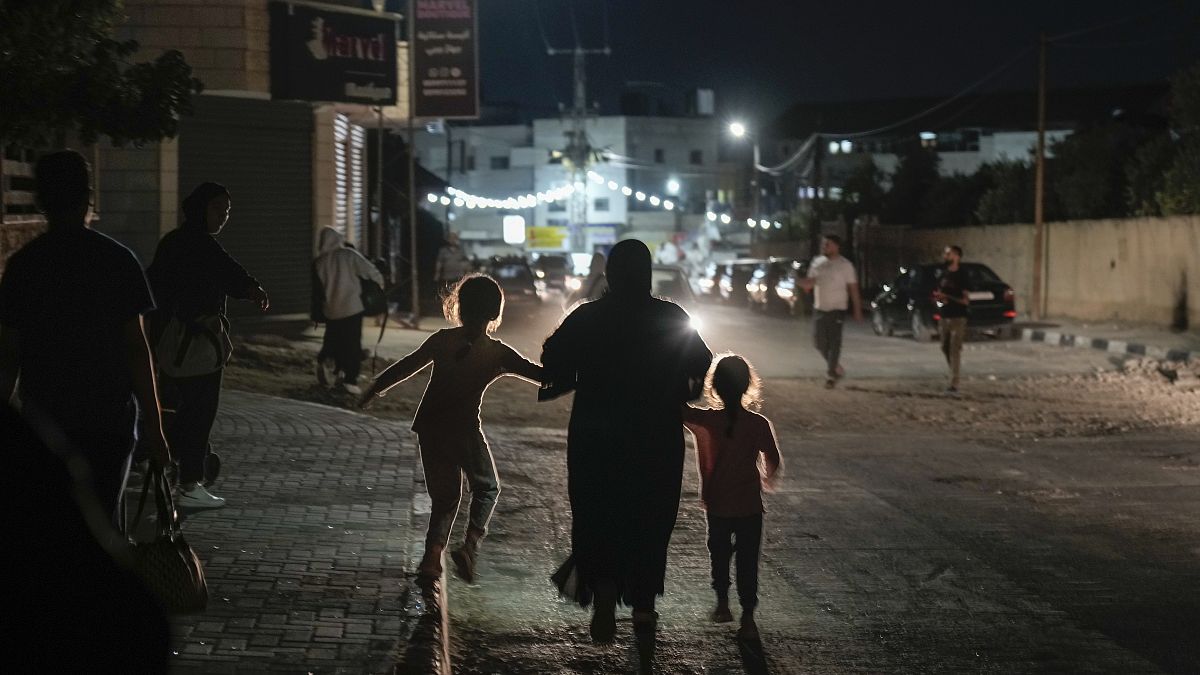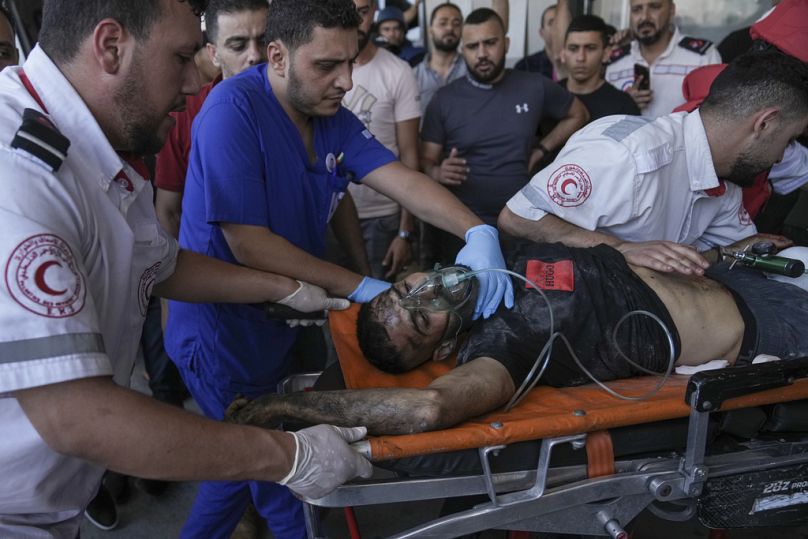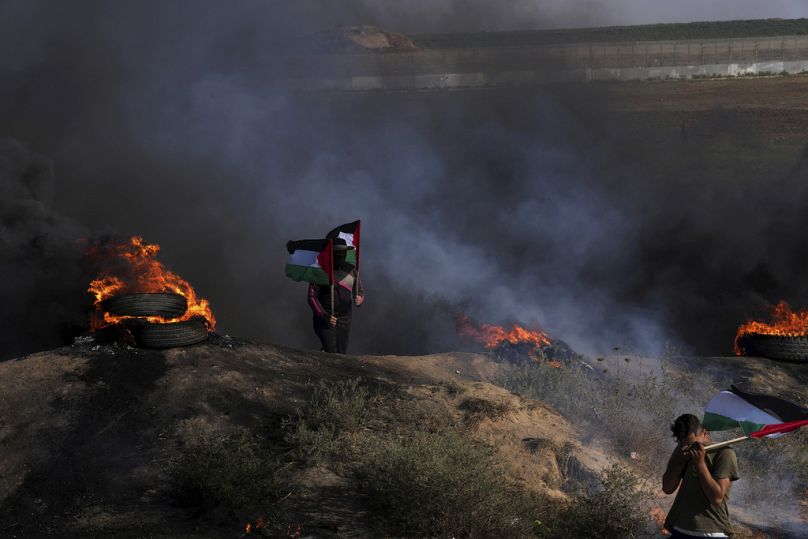At least seven people have been injured in a suspected car-ramming attack in Tel Aviv. It comes as Israel launches its most intense military operation in the occupied West Bank in years.
Israeli troops pressed ahead with their hunt for Palestinian militants and weapons in a West Bank refugee camp Tuesday, after military bulldozers tore through alleys and thousands of residents fled to safety. The two-day Palestinian death toll rose to 10.
The crackdown was reminiscent of Israeli military tactics during the second Palestinian uprising in the early 2000s.
It comes at a time of growing domestic pressure for a tough response to recent attacks on Israeli settlers, including a shooting last month that killed four Israelis.
The operation took place in the Jenin refugee camp - an area in the northern West Bank that has long been known as a bastion of militants. The fighting, which began shortly after midnight, continued past nightfall.
Throughout the day, black smoke rose from the crowded streets of the camp, a densely populated neighbourhood that is home to some 14,000 people, while exchanges of fire rang out and drones could be heard buzzing overhead. Military bulldozers ploughed through narrow streets, damaging buildings as they cleared the way for Israeli forces.
“There are bulldozers destroying the streets, snipers are inside and on roofs of houses, drones are hitting houses and Palestinians are killed in the streets,” said Jamal Huweil, a political activist in the camp, predicting the operation would fail.
The military blocked traffic in and out of Jenin, and the city resembled a ghost town. Streets were empty as armoured Israeli vehicles patrolled. Piles of burning tires and garbage containers littered traffic circles. Power and water supplies were knocked out in the camp.
Palestinian youths occasionally threw stones at army vehicles before darting away.
With the sound of shooting and explosions in the background, at least 10 ambulances rushed to the overwhelmed local hospital as relatives checked to see if loved ones were inside. One ambulance arrived with a bullet hole in front.
The Palestinians and three Arab countries with normalized ties with Israel – Jordan, Egypt and the United Arab Emirates – condemned the incursion, as did the 57-nation Organization of Islamic Cooperation.
Late Monday, the Palestinian leadership in the West Bank held an emergency meeting and said it was halting its already limited contacts with Israel. Leaders said a freeze on security coordination would remain in place, and they vowed to step up activity against Israel in the United Nations and international bodies. They also planned to minimise contact with the United States.
Israel’s prime minister, Benjamin Netanyahu, was unswayed.
“In recent months, Jenin has turned into a safe haven for terrorism. We are putting an end to this,” he said. He said the troops were destroying militant command centres and confiscating weapons supplies and factories. He claimed the operation was taking place with “minimum harm to civilians”.
Rear Adm. Daniel Hagari, the chief military spokesman, said there were a total of about 10 airstrikes - most of them aimed at keeping gunmen away from ground troops. He accused militants of operating next to a United Nations building and storing weapons inside of a mosque.
He said Israel launched the operation because some 50 attacks over the past year had emanated from Jenin.
Neither the prime minister nor Hagari gave any indication of when the operation would end.
UN Mideast envoy Tor Wennesland warned that the escalation in the West Bank was “very dangerous.” Asked about the Israeli drone attacks on residential areas, UN spokesman Farhan Haq said: "Attacks on heavily populated areas are violations of international humanitarian law".
Lynn Hastings, the UN humanitarian coordinator in the Palestinian areas, said on Twitter that she was “alarmed by the scale of Israeli forces operation" and noted the airstrikes in a densely populated refugee camp. She said the UN was mobilising humanitarian aid.
UNRWA, the UN agency for Palestinian refugees, said many camp residents were in need of food, drinking water and milk powder.
Late Monday, hundreds of Palestinians left the camp to flee the fighting. The Israeli army said it allowed people who wanted to leave to do so. The Palestinian Red Crescent rescue service said as many as 3,000 people had left by midnight, and they expected the exodus to continue.
The Jenin camp and an adjacent town of the same name have been a flashpoint since Israeli-Palestinian violence began escalating in spring 2022.
Israel says it has stepped up activity because the Palestinian Authority is too weak to maintain quiet. It also accuses its archenemy Iran of funding militant groups involved in the fighting.
Palestinians reject such claims, saying the violence is a natural response to 56 years of occupation, including stepped-up settlement construction by Israel's government and increased violence by Jewish settlers.
The Israeli-Palestinian conflict is experiencing its most violent period since the second intifada between 2000 and 2005.
More than 130 Palestinians have been killed this year in the occupied West Bank, part of more than a yearlong spike in violence that has seen some of the worst bloodshed in the area in nearly two decades.
Israel says the raids are meant to beat back militants. The Palestinians say such violence is inevitable in the absence of any political process with Israel and increased West Bank settlement construction and violence by extremist settlers.
Israel says most of those killed have been militants, but stone-throwing youths protesting the incursions and people uninvolved in confrontations have also died.
Israel captured the West Bank, east Jerusalem and the Gaza Strip in the 1967 Mideast war. The Palestinians seek those territories for their hoped-for independent state.


